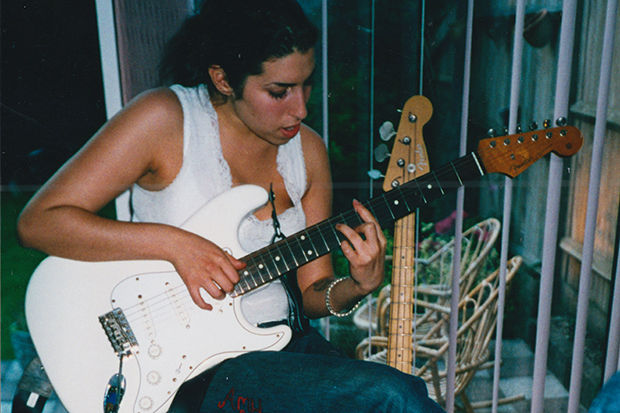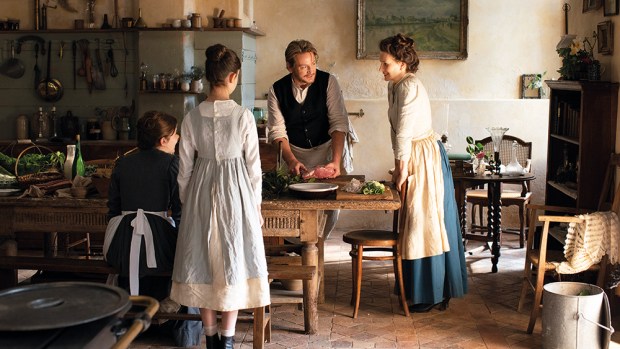Asif Kapadia’s documentary about Amy Winehouse, whom Tony Bennett describes as ‘one of the truest jazz singers that ever lived’, and who died of alcohol poisoning at 27 (FFS), is masterly and gripping, which is a pity, as you can’t look away. You will want to look away, and may even yearn to do so once the heroin comes into play, and the crack, and that husband and that gig in Belgrade, when she was all unsteady, shuffling and broken beneath the big hair, but you can’t. Oh, Amy, I kept thinking, if only — if only — you’d said, ‘Yes, yes, yes’. It is almost unbearable in this way.
Kapadia’s previous documentary, Senna, which traced the life of the doomed motor-racing star Ayrton Senna, and rightly won many awards, was also heartbreaking and painful, but not as heartbreaking and painful as Amy. Perhaps this is only because Ayrton meant nothing to me personally, whereas I was crazy for Winehouse from the moment I first heard her, which, you won’t be surprised to hear, was way after everyone else. (I am always last to the party — always.) That voice. That tiny body, and that voice, with its brilliantly weird transitions and phrasings, surging up from somewhere. Here, Kapadia tells her story in the same way he told Senna’s story. That is, he has combined existing footage (home videos, newsreels, performances, chat-show appearances) with off-screen talking heads and the result is so flawlessly orchestrated it feels as if the film was born this way, was simply there for the taking, even though it wasn’t; even though hours and hours of footage must have been pored over, and hours and hours of interviews conducted. This is a miracle of editing, as built into a powerfully compelling narrative. We know what will happen, yet it still plays out suspensefully, like a thriller.
The film opens with Amy at her friend’s 14th birthday— a sleepover, from the look of it — with Amy larking about and singing ‘happy birthday’. There’s the voice, of course, but also the face; that face, which isn’t beautiful, and isn’t not beautiful, but is fascinatingly out on its own and wondrously expressive. (There is one particularly magical moment when, during a press conference, a journalist asks her some inane question about Dido, and the face! When you bored Amy Winehouse, she certainly let you know it, I think it is safe to say.) Her early years as lived in Southgate, north London, are skipped over quite quickly, with her mother, Janis, who seems strangely absent from the rest of the film — although not quite as absent as her older brother, Alex, who doesn’t feature at all — remembering how Amy always tested her, and with Amy herself recalling how her father, Mitch, simply wasn’t around (he was seeing another woman, he confesses) and then left when she was nine. This affected her deeply, and she became something of a troubled young teenager: smoking, drinking, bunking school, having sex, developing bulimia, from which she never recovered, and always searching for a protective male father figure to make her feel safe, or so it is suggested.
We have her amazing music for company throughout, as well as Amy herself. She is bright, funny, talks Norf Laaaarndon, and is always truthful; didn’t seem to have a fake bone in her tiny body. During an interview with a Dutch radio station she says she is unhappy with one of the tracks on her first album, Frank, because, unbeknownst to her, it had strings put on it and whoever put those strings on, she hates them, and then there is the most awkward silence, presumably because the interviewer expected her to say how marvellous everyone involved was, and how happy she is with everything.
Her second album, Back to Black (which, when you listen to it now, sounds like a musical suicide note), put her totally on the map as an artist, but she was seriously floundering by then, and Kapadia does point the finger of blame. Aside from the promoters who insisted the show must go on when she wasn’t well enough, and the press who followed her everywhere, he points to Blake Fielder-Civil, who became her husband, who introduced her to crack and heroin, and who does not come out of this well. He did not, a drugs counsellor suggests, want her to get clean because, if she did, what would happen to him?
Also, Mitch, whom she worshipped, regardless, reappears. Mitch follows her to St Lucia, where she is holidaying and trying to get better, but turns up with a TV reality crew in tow. Mitch does, indeed, advise her against rehab, and if daddy says I’m fine. Still, maybe that which made her an amazing artist would have killed her anyway? If she had attended rehab at that point, she wouldn’t have composed ‘Rehab’, and then what? She’d have effectively ejected herself from her own narrative?
There are no answers. I know only that there won’t be any new songs, ever, and that, painful as this is, you won’t be able to look away …no, no, no.
Got something to add? Join the discussion and comment below.
Get 10 issues for just $10
Subscribe to The Spectator Australia today for the next 10 magazine issues, plus full online access, for just $10.
You might disagree with half of it, but you’ll enjoy reading all of it. Try your first month for free, then just $2 a week for the remainder of your first year.














Comments
Don't miss out
Join the conversation with other Spectator Australia readers. Subscribe to leave a comment.
SUBSCRIBEAlready a subscriber? Log in